Friday, November 25th, 2011 saw the Centre for South Asian Studies (CSAS) host its “Worlds of the Contemporary Global” event, which showcased the work of a wide range of CSAS Faculty. The packed event attracted a diverse audience of students, faculty and the public and marked the launch of many new critical conversations at CSAS. The day’s sessions began with opening remarks from Dr. Meric Gertler, Dean of the Faculty of Arts and Science, who commended CSAS for the rich conversations and innovative discourse on South Asia that has been initiated at the Centre. The Dr. David Chu Chair and Director of the Asia-Pacific Studies program, Professor Tak Fujitani, speaking on behalf of Dr. Joseph Wong, Director of the Asian Institute, further described the fertile connections between the ground-breaking intellectual projects in South Asian studies with cutting-edge work in comparative Asia studies.
Professor Ritu Birla, Director of the Centre for South Asian Studies, then introduced the discussion with a presentation on “Global Designs & Designations,” that considered how our contemporary concept of “the global” has been designed in knowledge and practice, and how we can explore the political, imaginative, material and aesthetic worlds that exist inside and outside the global space. A faculty member at St. George History, Professor Birla also celebrated the tri-campus, interdisciplinary faculty of the Centre, and the discussion to come. Following this enthusiastic introduction, the crowd was excited to hear the event’s first panel on “Visual Regimes, Technologies, and Genealogies,” with faculty specialists from Visual Culture Studies and the Department of Art. Professor Kajri Jain began with a talk on “The Aesthetics of Discrepant Globalization,” which highlighted her fascinating current research on the proliferation of new, massive monumental statues in India. Such statues, she argued, chart India’s new global economic geography, mapped by new material infrastructure such as highways, as well as vernacular worlds found in the circulations of the bazaar. Professor Dewan then presented her discussion on “Indian Painted Photographs Through a Transnational Lens” which illustrated the history and intricacies of the Indian painted photograph and its influence on global circuits of craftsmanship and artistic production today. Building on her comments about the masterful manipulations of the photograph by Indian craftsmen, the presentation concluded with a rich reflection on the “truth” of the photograph.
After a brief lunch break, in which attendees ruminated and conversed about the exciting discussions they had just heard, the second panel discussion on “Political Circuits and Mediations” commenced. Anthropology Professor Nais Dave presented a provocative talk on “The Intimacy of Human and Animal.” Professor Dave opened her discussion with the observation that launched her research: those who seek to be cosmopolitan in India often embrace meat-eating, to counteract orthodoxies. It is in this context that she became interested in the rise in the discourse of animal rights in India, a political project at once very close to orthodox Hindu practice, while at the same time, in its intellectual heritage, a product of modern discourses of political liberalism. This fascinating exploration of this genealogy of the Indian modern was followed by an equally compelling discussion of modern media in the South Asian context by Professor Francis Cody of Anthropology. Professor Cody addressed the ever-popular “Tamil tea shop” discussions and the ways in which such vibrant local practices enabled the reproduction of print media, just at a time when they seem endangered in the West. The practice of reading about current events aloud from a newspaper, and then vigorously debating them, offers a rich ethnography through which to understand the media and the concept of the public itself.
The event concluded with a panel of faculty members from the Department of Geography, speaking on “Neoliberal Environments.” Professor Raj Narayanareddy’s talk on “Recycling Urban Commons” told a detailed story about markets and scavengers in electronic waste in Bangalore, India. A gripping tale, it was also a critical reading of the relationship between waste, labour and the production of value—market value and gendered social value. Professor Narayanareddy’s discussion of this microenvironment and the macroscopic questions about capitalism that accompany it was perfectly complimented by Professor Katharine Rankin’s discussion of the cultural politics of governance in post-conflict Nepal. Asking what happens when revolutionary Maoist politics actually comes to inhabit power, Professor Rankin engagingly detailed the many-layered, micro-level negotiations and contradictions that enabled macro-level transformations in governance.
An important feature of the event was putting CSAS core faculty in touch with experts in other regions who also actively engage with transnational analysis, who served most generously as robust, challenging and deeply engaging respondents. The Centre was delighted that History Professor Elspeth Brown, Director of the Centre for the Study of the United States, Southeast Asia specialist Joshua Barker, Undergraduate Coordinator and Professor in the Department of Anthropology, and Professor of Geography and Planning, Kanishka Goonewardena were able to join us to build the critical questions via subcontinental worlds.
The final panel was followed by a reception, where attendees were able to chat with the South Asian expert panelists while enjoying delicious homestyle Gujarati dishes.
